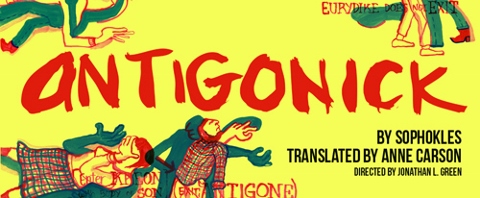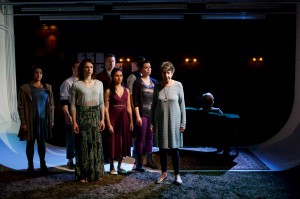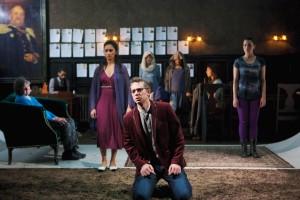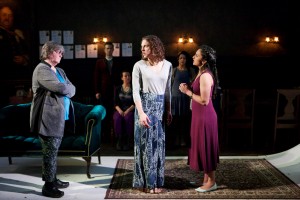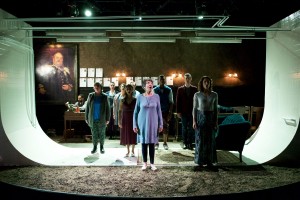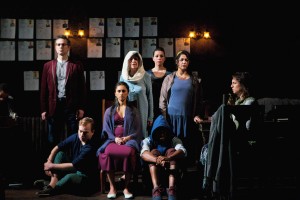SOPHOCLES, ANCIENT BENDER OF GENDERS
This “free translation” of Sophocles’ timeless tragedy about a sister against the state is only 75 minutes long. Even so, Antigonick manages to almost completely repeat itself. The catch or switch is that the protagonists’ sexes are reversed, as if to prevent a universal conflict from ever being sex-specific. Thanks to Canadian poet and MacArthur genius Anne Carson, Ann James gets to play both the Theban tyrant Creon and his adversary/victim Antigone. A terse showdown is repeated for effect. But it comes at a cost: There’s time enough for the truncated chorus to cast its commentary on Antigone’s uncompromisable challenge–but not for the play’s piteous part, Creon’s agonizing, almost paternal, attempts to talk Antigone out of her suicidal protest. This is definitely not a fight in the family.
Sophocles—and the Greek legend from which he drew–regarded this early Joan of Arc as the Ur example of a lone individual confronting authority. Which should prevail—a patrician girl’s suicidal demand for posthumous justice for a beaten brother or Creon’s desire that the law be observed and obeyed? It’s a battle between private passion and public power that echoes down the centuries. As Yeats said of the Irish rebels of 1916, we feel about Antigone: “A terrible beauty is born.”
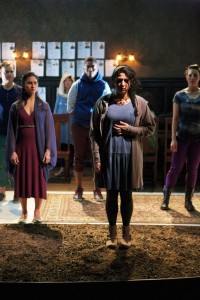 Set in Yu Shibagaki’s curious combination of a 19th century men’s club and a skateboard ramp, Antigonick (the title vaguely questioning what’s meant by “the nick” of time) opens with a mysterious clerk named Nick (David Lawrence Hamilton) posting printed profiles of the principals. As this modern Fate covers the wall with the usual suspects, Antigonick plays yet another variation on Sophocles’ tautly balanced dilemma: Will Antigone become a self-made martyr, destroying her marriage to Creon’s son Haimon and placing her perversely pure sacred imperative (to give her brother religious burial) over the interest of the state to properly punish a traitor? As it was over two millennia ago and stays today, it’s a zero-sum game played for the highest stakes. Is it worse to be unlawful or unholy? Given these implacable extremes, the outcome–which by the end claims three lives, not one–is unstoppable and inevitable.
Set in Yu Shibagaki’s curious combination of a 19th century men’s club and a skateboard ramp, Antigonick (the title vaguely questioning what’s meant by “the nick” of time) opens with a mysterious clerk named Nick (David Lawrence Hamilton) posting printed profiles of the principals. As this modern Fate covers the wall with the usual suspects, Antigonick plays yet another variation on Sophocles’ tautly balanced dilemma: Will Antigone become a self-made martyr, destroying her marriage to Creon’s son Haimon and placing her perversely pure sacred imperative (to give her brother religious burial) over the interest of the state to properly punish a traitor? As it was over two millennia ago and stays today, it’s a zero-sum game played for the highest stakes. Is it worse to be unlawful or unholy? Given these implacable extremes, the outcome–which by the end claims three lives, not one–is unstoppable and inevitable.
Performed to the ominous beat of a very loud metronome, Carson’s meta-aware 2012 adaptation throws in repeated references to Hegel, Beckett, and Virginia Woolf, along with such charmless anachronisms as Creon’s imperial greeting “What’s up?” Jonathan L. Green’s supple staging makes the most of Carson’s fluid transitions from solo speeches to communal outbursts, playing with possibilities as it deconstructs a seemingly set story.
Carson’s “re-imagining” mostly works, thanks to performances that are driven and yet, even within the same switched roles, intriguingly diverse. Sideshow Theatre Company (which perpetrated its own inversion with Chekhov in Stupid Fucking Bird) is honest enough to hint at the many possible approaches to such seminal roles as Creon, Antigone, Haimon, the blind augur Teiresias, even the messenger (Ms. James, for instance, is able to suggest both a grim Rod Steiger as Creon and an apple-cheeked ingénue as Antigone).
The “deja vu” result is two Antigones–and Antigones–to choose from. But that risks the dangerous chance that neither hits the heart of Sophocles’ choice, that the play in effect falls between two stools. Let the viewer beware.
photos by Jonathan L. Green
Antigonick
Sideshow Theatre Company
Victory Gardens’ Richard Christiansen Theater, 2433 N. Lincoln Ave
Thurs-Sat at 7:30; Sun at 3
ends on April 5, 2015
for tickets, call 773.871.3000 or visit VG
for more info, visit Sideshow
for more shows, visit Theatre in Chicago
